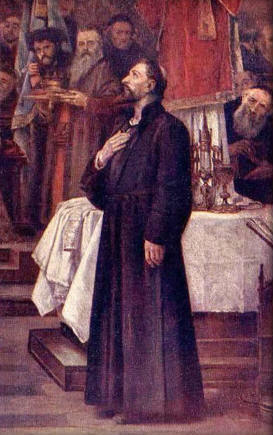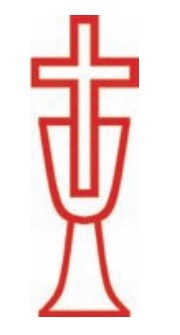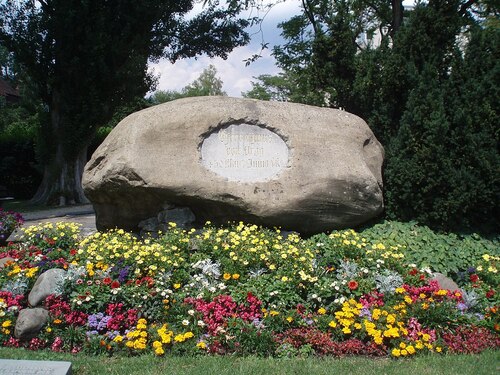
Czech Theologian Jan Hus
Jan Hus (around 1370 Husinec - 6th July 1415 ) was a Roman Catholic priest, Czech medieval religious thinker, university teacher, reformer and preacher. Hus was, after John Wycliffe, whose ideas and arguments inspired him, one of the first reformers of the church, almost one century ahead of his successors – the reformers Luther, Beza, Calvin and Zwingli.
From 1398 Hus taught at the University of Prague, and in 1409-1410 he was its rector. In his religious works, he criticized the moral decline in which the Catholic Church found itself. The Catholic church called him a heretic, his teachings a heresy, and excommunicated him (1411). Nevertheless, in November 1414 Hus came to the Council of Konstanz to be cleansed of all allegations. However, he was condemned as a heretic, and was subsequently handed over to secular power to be burned at the stake when he refused to recant his teachings.

In the Czech Republic today, 6th July, people will commemorate the anniversary of the death of the church reformer Jan Hus, who was burned for his views 607 years ago at a council in a German Konstanz. People can honor his memory at church services in the Bethlehem Chapel in Prague or in Hus's birthplace - Husinec near town Prachatice. In addition to his efforts to reform the church and society, Hus is credited with authoring a reform on Czech spelling, which introduced Diacritical Marks. As for example č(read as cz),š(read as sh),ř, á, é etc.
Hus and the Czech language
The works of Jan Hus incorporate reforms to medieval Czech orthography, including the "hook" (háček) diacritic which was used to form the graphemes ⟨č⟩, ⟨ě⟩, ⟨š⟩, ⟨ř⟩ and ⟨ž⟩, which replaced digraphs like ⟨cz⟩, ⟨ie⟩, ⟨sch⟩, ⟨rz⟩ and ⟨zs⟩; the "dot" above letters for strong accent, as well as the acute accent to mark long vowels ⟨á⟩, ⟨é⟩, ⟨í⟩, ⟨ó⟩, and ⟨ú⟩, in order to represent each phoneme by a single symbol.

Václav Brožík - Jan Hus at Concile in Konstanz, detail
Jan Hus criticized the church for deviating from its original ideals, rejecting its institutionalization, pointing to priests living in sin, or buying indulgences. The church called him a heretic and at the Council in Konstanz on 6th July 1415, where Hus was burned. His death led to a major Hussite revolution in the Czech lands, during which the Hussites defeated several crusades between 1420 and 1431, and their faith firmly took root in the country. Hus's legacy remained alive even later, when after 1620 a wave of often violent re-catholization occurred.
His condemnation was also seen as a condemnation of the Czech Kingdom and its orders. On 2nd September 1415, a letter of complaint was sent to the council in Konstanz, bearing 452 seals of Czech and Moravian nobles and a week later, 11th September 1415, Prague university issued a certificate of Jan Hus ' integrity and orthodoxy.
.jpg)
K.F.Lessing - Jan Hus in Konstanz
Five centuries after his death, Hus's views stood at the foundation of an independent Czechoslovak state, and the Czechoslovak legions claimed the legacy of the Hussites.
What is the Czechoslovak Hussite church?
Church founded after founding of Czechoslovak Republic arouse in 1920. The Czechoslovak Hussite church refers to the effort to return to the original church or to the true core of Christianity as the sources of its doctrine.
The Czechoslovak Hussite church consists of Christians who seek to fill the present moral and scientific endeavors with the spirit of Christ, as preserved to us in the holy scriptures and in the old Christian tradition, and as witnessed by the Hussite, Czech brethren and other reformation efforts.

Symbol of Czechoslovak Hussite Church
Jan Hus had more followers - one of them was Jeroným Pražský, Jerome of Prague. He shared his fate and on 30 May 1416 was also burned at Konstanz.

Hus memorial in Konstanz, Germany, at Bodensee
Moravian Church , Members of the Unitas Fratrum and Czech Brethren claim Hus as a spiritual forerunner.
In 1999, Pope John Paul II declared that he regrets the cruel death of Jan Hus and the subsequent victims and divisions in the Czech nation and called for reconciliation and a historical evaluation of his personality without prejudice. However, despite the widespread opinion, he did not explicitly declare Jan Hus a reformer of the church.
Thanks for reading
Margaret
